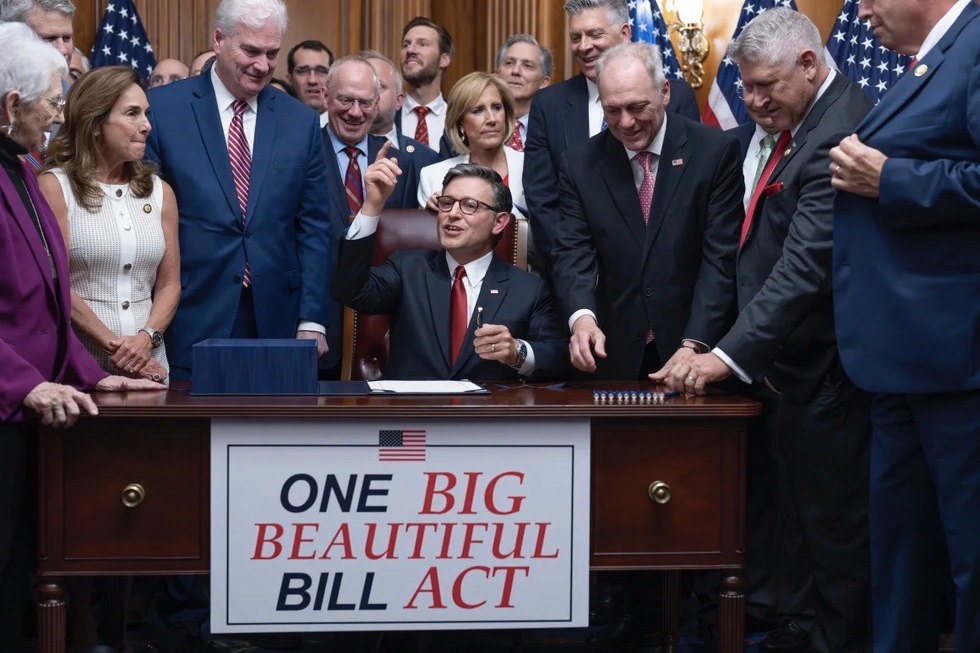One Big, Beautiful Bill – and what it means for your business taxes in 2025

A sweeping reform with lasting impact for small and medium-sized businesses
The tax code just got a makeover, and small businesses are finally getting more than just the leftovers.
In mid-2025, Congress passed the One Big, Beautiful Bill – a sweeping package of tax reforms that promises lasting change. Many once-temporary tax provisions are now permanent, while new deductions and reporting updates aim to simplify life for business owners.
Whether you're a sole proprietor, S-corp, or manage a team of contractors, these updates are designed with Main Street, not just Wall Street, in mind.
Let’s break it down.
Bigger, permanent breaks for business income
Section 199A QBI deduction made permanent
The Qualified Business Income (QBI) deduction – originally created in the 2017 Tax Cuts and Jobs Act – has now been made permanent, eliminating years of uncertainty for pass-through business owners.
If you operate as a sole proprietor, S-corp, partnership, or other pass-through entity, you can continue deducting up to 20% of your qualified business income, provided you meet certain criteria.
Who qualifies?
- Pass-through entities such as sole proprietorships, partnerships, and S corporations.
- Service-based businesses (law, accounting, consulting, etc.) are still subject to income phaseouts.
- Deduction amount and income thresholds will now be indexed to inflation going forward.
Planning tip: structure smart
Entity structure matters. S-corps may be better positioned than sole proprietors to take full advantage of the QBI bump. Consider revisiting your business formation before year-end.
Simpler contractor reporting: 1099-NEC threshold rises
Remember the dreaded $600 rule? If you paid any contractor or freelancer over $600, you had to issue a Form 1099-NEC.
That’s changing – finally.
New reporting threshold: $2,000
Effective for payments made after Dec 31, 2025, businesses will only need to issue 1099s for contractors paid $2,000 or more.
- Applies to: Non-employee compensation (independent contractors, subcontractors, gig workers)
- Adjusted for inflation annually starting 2027
| Year | Threshold | Applies to |
|---|---|---|
| Through 2025 | $600 | All contractors/freelancers |
| Starting 2026 | $2,000 | Indexed annually |
This change reduces administrative burden significantly for businesses using many small vendors.
Still issue a 1099 if:
- Payments were made in 2025 (old rule applies).
- Your vendor explicitly asks for documentation.
- State or local tax laws require lower thresholds.
SALT deduction expanded: relief for high-tax state filers
High-income filers in high-tax states like New York, California, and New Jersey have been frustrated by the $10,000 cap on State and Local Tax (SALT) deductions.
New limit: $40,000 (starting 2025)
The SALT cap is lifted to $40,000, but only for taxpayers with:
- AGI under $250,000 (if filing separately from spouse).
- AGI under $500,000 (married filing jointly).
This gives owners in high-tax states more flexibility in managing their tax exposure.
What about pass-through SALT workaround?
Many states already allow entity-level SALT payments, enabling businesses to deduct state taxes at the business level.
These workarounds are still valuable – but the raised cap might shift the calculus for some owners.
New deduction: vehicle loan interest (up to $10K/year)
Starting in 2025, businesses may deduct up to $10,000 per year in interest on loans for passenger vehicles—but only if the vehicle meets a key condition: it must be assembled in the US.
This new deduction can offer significant tax relief for businesses that rely on vehicles for operations, sales, or client service.
What qualifies?
- The vehicle must undergo final assembly within the United States – meaning the car must be largely complete before being shipped to a dealer.
- The origin of individual parts does not matter; what counts is where the final product takes shape.
- Applies to passenger vehicles used for legitimate business purposes.
✅Example: A car assembled in Tennessee with parts from Germany qualifies.
❌Example: A car built and completed overseas – even if sold in the US – does not.
Who benefits most?
- Fleet operators managing multiple vehicles for delivery or service.
- Sales teams that rely on regular business travel.
- Client-facing professionals using personal vehicles for work under reimbursement plans.
Estate planning certainty for business owners
Planning to pass on your business – or just your hard-earned assets – to the next generation?
There’s good news: uncertainty around estate and gift tax thresholds may finally be a thing of the past.
$15M exemption becomes permanent in 2026
Beginning in 2026, the estate and gift tax exemption is set at $15 million per individual, and indexed for inflation thereafter.
This brings much-needed predictability for:
- Family-owned businesses.
- Entrepreneurs nearing retirement.
- Owners considering strategic gifting or transfers.
Pro insight: A married couple will be able to shelter up to $30 million from estate tax – with proper planning. This opens the door to trusts, family partnerships, and succession plans without the usual anxiety over tax cliffs.
Labor & compensation considerations
While many provisions in the One Big, Beautiful Bill (OBBB) benefit business owners directly, some are designed to support employees – especially those in hourly or tipped roles.
These changes affect payroll planning, compliance, and how businesses manage compensation structures.
Tip income: no federal income tax on up to $25K
The bill allows eligible workers to deduct up to $25,000 in tip income per year from their federal taxable income.
However, the benefit phases out starting at $150,000 in modified AGI ($300,000 if filing jointly).
This deduction applies only to:
- Voluntary tips (not mandatory service charges).
- Workers in occupations that customarily receive tips (to be defined by Treasury).
- Those with work-eligible Social Security numbers.
This is particularly relevant for businesses in:
- Hospitality and food service.
- Salons, spas, and other personal services.
NOTE! This is a deduction from taxable income, not an exclusion from payroll tax. FICA still applies, and employers must continue withholding.
Overtime pay: no federal income tax on up to $12.5K
Similarly, the bill provides a deduction for up to $12,500 in overtime wages paid to qualifying employees each year ($25,000 for joint filers), with the same $150K/$300K phaseout thresholds.
To qualify, the overtime must:
- Be paid in accordance with FLSA section 7 rules (1.5x regular rate).
- Exceed the employee’s standard hourly wage.
- Be reported appropriately on Form W-2 or 1099, depending on worker status.
This opens the door for employers to:
- Re-evaluate employee classification.
- Restructure shifts for eligible staff to maximize their tax-free overtime benefit.
- Ensure strict compliance with both federal and state labor laws.
Remittance transfers: beware the 1% excise
If your business sends money overseas using cash or physical instruments (like money orders or cashier’s checks), take note:
New 1% excise tax on remittance transfers
Starting in 2025, the bill imposes a 1% tax on remittance amounts – but only when:
- The sender uses cash, money orders, cashier’s checks, or similar instruments
It does not apply to:
- Bank account transfers
- Debit or credit card payments
- Online payment platforms (if linked to US accounts)
Impact on business owners
- If you pay vendors, contractors, or overseas employees via physical methods: rethink your transfer strategy
- Switch to electronic payments to avoid unnecessary taxes
How TFX can help you adapt
Navigating a new tax environment takes more than just reading the headlines.
At TFX, we help small and medium-sized businesses understand, apply, and optimize every tax opportunity – old and new. With over 20 years of experience, a 90% client retention rate, and tax returns filed for 50,000+ clients, we know what long-term advisory really means.
Here’s how we support business clients:
- Tax strategy sessions tailored to your industry and structure.
- Help choosing the right business entity type.
- Advice on contractor vs. employee classification and compliance.
- Guidance on succession and estate planning.

Bottom line: Act now, not in April
The One Big, Beautiful Bill rewrites many of the rules – and not just for 2025. It sets a new long-term tax baseline for how businesses grow, pay, invest, and eventually transfer wealth.
But these changes aren’t just for reading – they’re for acting on. That means:
- Reviewing your structure before year-end
- Reassessing how you pay workers and contractors
- Strategizing around vehicle purchases, estate transfers, and deductions
If you're not yet working with a tax advisor who knows your business inside and out, now’s the time to start. And if you're looking for guidance grounded in human expertise, real relationships, and global know-how – we’re here for you.
Let’s make 2025 your most tax-efficient year yet.
FAQ
Yes - the Qualified Business Income (QBI) deduction remains at 20% and is now permanent under the new law. It continues to apply to most pass-through entities such as sole proprietors, partnerships, and S corporations, though income limits and service business restrictions still apply.
The $2,000 threshold applies only to payments made after December 31, 2025. Until then, the $600 rule remains. Regardless, it's best practice to collect W-9s and track all payments.
Up to $10K/year is deductible if the vehicle is assembled in the US, regardless of where parts are sourced. Fleet operators or sales-focused businesses may benefit most.
Locking in a $15M (per person) exemption allows you to strategically gift or transfer business assets in a tax-advantaged way. Starting early lets you leverage valuation discounts and trusts.
Only if you're sending payments using cash, money orders, or similar physical methods. Payments via bank accounts, debit, or credit cards are exempt.



